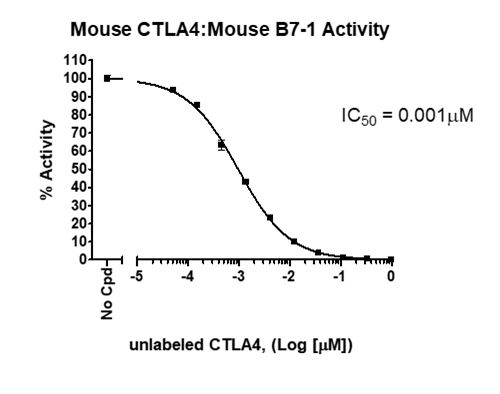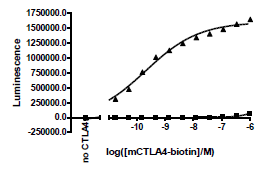Mouse CTLA4[Biotin]:B7-1 Inhibitor Screening Assay Kit
The Mouse CTLA4[biotin]:B7-1 Inhibitor Screening Assay Kit is designed for screening and profiling inhibitors of mouse CTLA4:B7-1 signaling. The key to this kit is the high sensitivity of detection of biotin-labeled mouse CTLA4 by streptavidin-HRP. Only a few simple steps on a microtiter plate are required for the assay. First, B7-1 is coated on a 96-well plate. Next, CTLA4[biotin] is incubated with B7-1 on the plate. Finally, the plate is treated with streptavidin-HRP followed by addition of an HRP substrate to produce chemiluminescence, which can be measured using a chemiluminescence reader.
Need us to run inhibitor screens or profile your compounds against Mouse CTLA4[Biotin]:B7-1? Check out our Immunotherapy Biochemical Screening Services.
| Catalog Number |
Component |
Amount |
Storage |
|
| 79001 | Mouse CTLA4 (CD152), Fc-Biotin-labeled | 2 µg | -80°C |
|
| 79058 | Mouse B7-1 (CD86), Fc fusion | 5 µg | -80°C | |
| 79742 | Streptavidin-HRP | 10 µl | +4°C | |
| 79311 | 3x Immuno Buffer 1 | 50 ml | -20°C | |
| 79728 | Blocking Buffer 2 | 50 ml | +4°C | |
| 79670 | ELISA ECL Substrate A | 6 ml | Room Temp |
|
| 79670 | ELISA ECL Substrate B | 6 ml | Room Temp |
|
| White 96-well microplate | 1 | +4°C | ||
1. Ohtani, H., et al., Lab Invest. 1997; 77(3): 231-241.
2. Rovert, C., et al., N. Engl. J. Med. 2011; 364: 2517-25262.



